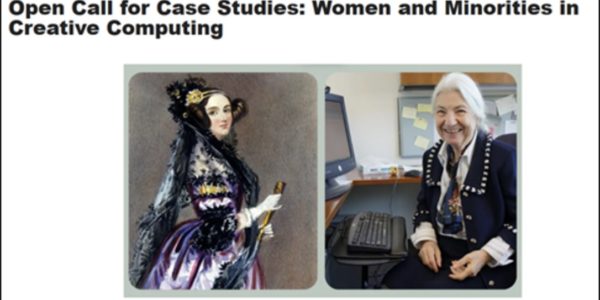Hacktivists, indie game developers, BBS admins, F/LOSS-developers, tech- and media-artists, demosceners, Wikipedians – there are many communities that made the internet a space to exchange ideas, knowledge and innovation beyond commercial interest. However, many of their contributors’ stories remain untold. It is time to change this.
In collaboration with the European Commission
Wikimedia CH’s Innovation Programme is coordinating and collaborating with the EU-funded researchers network COST Action GRADE (Grassroots of Digital Europe)[1] and the non-profit association Echtzeit – Digitale Kultur [2] to uncover those biographies, specifically of marginalised contributors from roughly the 1950s to early 2000s. The objective is to make them openly accessible in classrooms all over Europe, as it is important to reflect all walks of life and cultures that Europe has to offer. COST Actions are a vessel of the European Commission to foster open collaboration between European scientists, innovators and communities across all scientific disciplines. It provides networks and financial support for common research, networking and to ensure Open Access to the working groups’ outcomes. To achieve this goal, this Open Call for Case Studies: Women and Minorities in Creative Computing[3] has been launched.
Everyone is invited to contribute
The programme is supporting you in conducting interviews, researching and documenting the stories of the European female, LGBTQIA+, BIPOC, displaced or otherwise socio-economically disadvantaged early pioneers. They have been there, building and enriching new environments to overcome those factors and finding communities. Together with the GRADE programme, Wikimedia CH is explicitly inviting everyone to contribute. Wikimedia CH is happy to provide the necessary affiliation with you to complete this work.
Submit by 17 April 2025
Participants should submit an abstract by 17 April, and later an essay, about one of the hidden figures of our digital grassroot movements. For that, GRADE will award grants for short-term scientific missions or virtual mobility grants (daily allowances by country). Your contact at Wikimedia CH is Shana Marinitsch of our Innovation Programme, who beside her work for our association is also a prolific organiser in the European demoscene. She has been invited to join the network last year to create a better link between the Action and our communities. At the belGRADE (the 3rd GRADE Conference in Belgrade from 13 and 14 March), existing contacts were deepened.
GLAM-Programme also present
Wikimedia CH’s GLAM programme was also present at this event. GLAM lead Sandra Becker gave a talk on the visibility of women in digitisation and Wikipedia projects. Although the profession ‘computer’ was once a purely female profession when highly qualified mathematicians calculated the operations that later computers could do, they were pushed out of IT with the development of the personal computer. The central question was: How can we get them back in? As examples, she mentioned the two wiki projects Matrimoine and the FemNetz network.
In line with Wikimedia CH’s Care Forward initative
Wikimedia CH’s support for this Open Call for Case Studies: Women and Minorities in Creative Computing is in line with our Care Forward initiative. It embraces a holistic approach to building a more sustainable and inclusive future in close collaboration with the global Wikimedia Movement. Therefore, we run ‘More Women for Wikipedia’ and the Community Care programme. Both stand for our general commitment to diversity and gender equity.
If you have questions, please contact@wikimedia.ch
Interested? Here are the next steps:
- Write an abstract (English, ca. 200 words) describing the person and their achievements, as well as your planned effort in researching this person
- Submit your proposal until April 17th, 2025, to the Open Call Committee
- Create an e-COST profile[4] and join the Action (reason/contribution: Open Educational Resource for Working Group 1)
- Await feedback until end of April
- Submit an essay (in English) and pictures, artifacts and references until August 31st, 2025
- Get in touch with Shana Marinitsch from our InnovationLab if you would like to have any support, have questions or to receive guidance on eligibility. Please email to contact@wikimedia.ch
Example 1 Abstract:
In 1976, Narnian journalist Zeus Knight revealed in an interview with I.D., the enigmatic creator behind some of the first text adventure games in Narnia, that his sister had in fact been the designer of the final obstacle in the game Watermelon (Knight, 1976). The identity of the sister remained unknown for a long time, but recent research has revealed that Anna May, an architect with a background in painting, had collaborated with I.D. on many creative projects, including video games.
Example 2 Abstract:
This case study is designed to research the historical relevance of Anna May for video games in Narnia and Fictional game history. The research employs the X-factor approach (explain approach) to outline/develop/construct (explain what). The aim of the study is to also examine methodological issues that arise when studying women’s involvement in video game history and production and explore XX YY, and ZZ, interrogating the dominant understanding of creativity, generated in the context of a history where women creators have, for various reasons, been largely overlooked.
Read more
[1] EU Page: Action CA21141 – COST
[2] Echtzeit – Digitale Kultur
[3] Open Call for Case Studies – Grassroots of Digital Europe
[4] GRADE Application Form: e-COST Registration
- Care forward – Care Forward – Wikimedia
- More Women for Wikipedia – Wikimedia
- Community Care – Wikimedia CH
- https://www.linkedin.com/groups/9501999/
- Diff Blog Article




